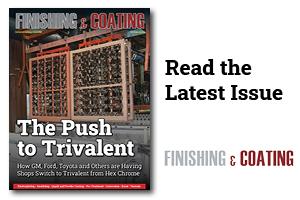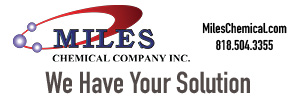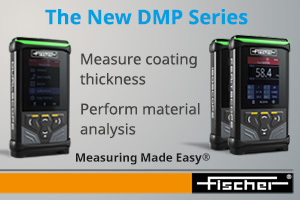The finishing industry requires many operations to pay attention to who their competition might be, and sometimes, it even requires them to join forces.
That was the case back in 2011 when two Connecticut finishing operations — Quality Rolling & Deburring and Donham Craft — decided to unite to augment what each brought to their customer base, which often overlapped.
The result was UniMetal Surface Finishing, which boasts itself as one of the largest finishing and plating operations on the East Coast, with two facilities of 160,000 square feet of space and about 130 employees.
“We overlapped about 15% to 20% of our business, so it was a nice compliment to each other and a nice fit,” says George LaCapra Jr., President of UniMetal. “As far as volume, we are definitely one of the highest in the region.”
Numerous Treating and Finishing Operations
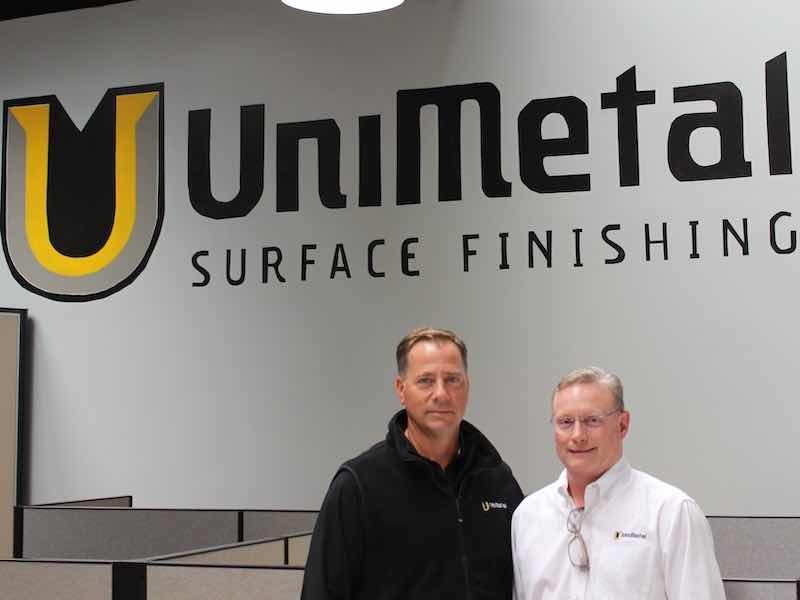 George LaCapra Jr., left, and Patrick Hayden The company specializes in plating, cleaning, deburring, plating, and heat treating for numerous aerospace, automotive, communications, military, and medical companies in the U.S.
George LaCapra Jr., left, and Patrick Hayden The company specializes in plating, cleaning, deburring, plating, and heat treating for numerous aerospace, automotive, communications, military, and medical companies in the U.S.
LaCapra and his family owned Quality Rolling & Deburring and merged it with Donham Craft, which was run by Patrick Hayden, who is now Senior Vice President – CTO at UniMetal.
Donham Craft brought to the table high-quality plating processes such as zinc, nickel, copper, tin, gold, and silver, all of which augmented Quality Rolling & Deburring’s offerings.
“We happened to share customers that liked us both, and we each had our specialties,” Hayden says. “We have been able to carry that forward, which was the primary reason for the blending of the companies.”
The merger has made UniMetal one of the most diverse finishing shops in the Northeast and includes engineers, chemists, process specialists, and what LaCapra and Hayden call employees with “can-do attitudes,” who work to turn tough challenges into strong solutions.
The company has two facilities in Connecticut: one in Thomaston, that serves as headquarters and another in Naugatuck. Their key to success is running high-volume barrel, reel-to-reel, and short-run rack plating; in addition, they offer cleaning, deburring, precision cleaning, and vibratory finishes.
“We think of ourselves as a one-stop shop,” LaCapra says. “It was an intentional act to say ‘Let’s get together,’ because the best way to grow your business is with your current customer base.”
Extensive Experience in Finishing Industry
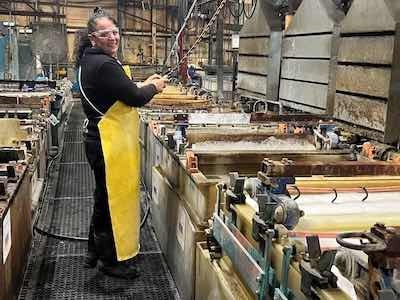 UniMetal Surface Finishing boasts itself as one of the largest finishing and plating operations on the East Coast, with two facilities of 160,000 square feet of space and about 130 employees.LaCapra, who has almost 30 years in the industry, is a third-generation owner whose family got its start in 1949. His father, George Sr., is the CEO of UniMetal and has almost 50 years of experience.
UniMetal Surface Finishing boasts itself as one of the largest finishing and plating operations on the East Coast, with two facilities of 160,000 square feet of space and about 130 employees.LaCapra, who has almost 30 years in the industry, is a third-generation owner whose family got its start in 1949. His father, George Sr., is the CEO of UniMetal and has almost 50 years of experience.
Donham Craft was founded in 1963 and was also family-owned. Hayden got his start in the finishing industry when his father-in-law introduced him to David Niven, then owner of the company. Hayden worked there for several years before joining McGean-Rohco where his father-in-law was vice president of the Rohco Division. Being a technical sales and service engineer took him into dozens of shops over the years and educated him quickly on how the best operations should be run.
“It was an opportunity to become educated in the electroplating field and got to see a lot of other facilities,” Hayden says. “That was invaluable.”
Eventually, he went full circle in his career as he became a regional manager with McGean Rohco, where Donham Craft soon became one of his accounts. His relationship with Niven grew so much that he went back to work for the shop and became a partner in Donham Craft in 1982.
In 2008, Hayden bought Donham Craft and became full owner of the company at just the same time as a recession was making business difficult for everyone. It was about that time that he started having discussions with LaCapra on possibly merging the two companies.
“We did overlap by about 15%,” Hayden says. “But what it comes down to is we shared many customers but we each got the opportunity to finish parts numbers that best suited our specialties.
Providing Additional Support on Processes
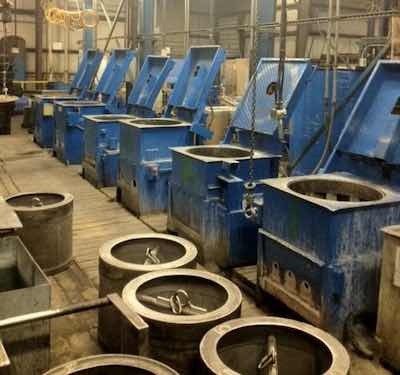 The company specializes in plating, cleaning, deburring, plating, and heat treating.LaCapra says it made sense to blend the two companies together.
The company specializes in plating, cleaning, deburring, plating, and heat treating.LaCapra says it made sense to blend the two companies together.
“Some of our cleaning customers needed plating,” he says. “Maybe they weren’t getting it from either of us, but we knew we had the opportunity to grow the business organically. The other part was there was a necessity on both ends that we were going to get additional support, especially technically when it comes to the electroplating side. And our team was very technical on the cleaning on the deburring side. It made a lot of sense.”
At the time of the merger, Donham Craft had an automatic zinc line and an automatic nickel line in Naugatuck, as did Quality Rolling & Deburring. Hayden says it gave the new company an opportunity to move some of its customers to the other location, which opened up an area where they could expand into the mechanical zinc finishing area.
“We got to open up a whole room that ended up being another 8,000 square feet that allowed us to go ahead and venture off into other opportunities,” says Hayden, who added that combining the strengths of each company allowed UniMetal to better serve all of its customers.
“A large customer of ours can have a dossier of 40 parts or over a hundred parts,” he says. “So it might be that some parts end up being cleaned and deburred, and they’re done and go off to the customer, or some might just need nickel, silver, or gold plating. George wasn’t doing the silvers or the golds, but maybe they needed the deburring application, so he might have had them for the clean and deburring side, and I had them as a different company from the plating side. When they came together, all of a sudden, you have that one-stop shop, and we maintain both parts of the business now.”
LaCapra says what worked to their advantage was that many OEMs and manufacturers want to try to limit the number of vendors they are working with, as well as reduce the amount of time that their parts are being shipped around.
“I think when you’re dealing with OEMs, they want to deal with stable companies that have some strength behind them, not only in the number of employees, but I think technically, too,” he says. “If you’re already existing with a certain supplier or a vendor and you have those abilities, you are not going to be the one that’s going to get cut out on a downsizing or elimination of vendors.”
Tri-Metal Plating Capabilities
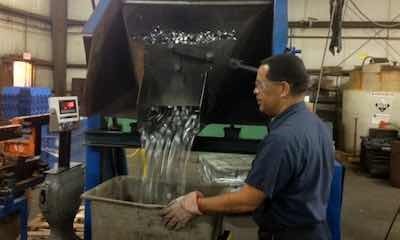 UniMetal has distinguished itself with its tri-metal plating capabilities, where a deposition of an alloy coating of copper, tin, and zinc. White coatings contain about 52.5% copper 32.5% of tin, and 15% zinc. Other alloy concentrations can yield different colors and characteristics. Yellow coatings as alloy components, on average, contain 80% copper, 17.5% tin, and 2.5% zinc; 85% copper, 10% tin, and 5% zinc; or even a mixture of 85% copper and 15% tin.
UniMetal has distinguished itself with its tri-metal plating capabilities, where a deposition of an alloy coating of copper, tin, and zinc. White coatings contain about 52.5% copper 32.5% of tin, and 15% zinc. Other alloy concentrations can yield different colors and characteristics. Yellow coatings as alloy components, on average, contain 80% copper, 17.5% tin, and 2.5% zinc; 85% copper, 10% tin, and 5% zinc; or even a mixture of 85% copper and 15% tin.
“When it comes to tri-metal, we are unique in that we are one of a half a dozen shops in the country that have a high volume capability, both rack and barrel,” Hayden says. “The other unique application is mechanical zinc plating and galvanizing. Again, there may be only a dozen shops in the country that do that.”
Located where they are — in the Naugatuck River Valley in the western part of Connecticut — puts them in the middle of many stamping, metal turning houses, and spring manufacturing operations, some of which date back to the Civil War era.
Those types of industries are what required UniMetal to tailor its finishing services — from cleaning to burr removal to descaling and all types of finishes — to many of those manufacturers who are located nearby and require various types of needs.
“We needed to be diversified enough to handle springs as well as stampings as well as machined parts both large and small,” Hayden says. “That is what has made us prosperous in this region in having a number of different applications that we can do, as well as the variety of the finishes.”
Diversity Makes UniMetal Stronger
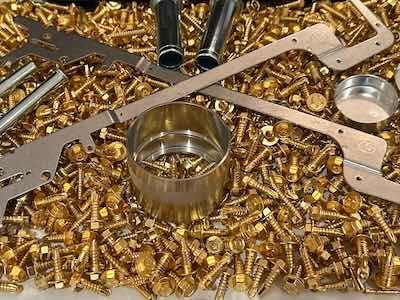 LaCapra says the diversity of what UniMetal can offer is what has made it stronger in tough economic times.
LaCapra says the diversity of what UniMetal can offer is what has made it stronger in tough economic times.
“We don’t have direct competitors in everything that we can do, but we have competitors in cleaning, in deburring, and in electroplating locally,” he says. “What makes us so diverse is that if one industry is slow, we can pick it up in a different industry. If one finish is slow, we pick it up in another. That’s how we’ve been able to sustain, survive, and maintain our diversity when it comes to helping our customers.”
UniMetal’s involvement in the Waterbury community recently earned them a distinguished award when the Waterbury Regional Chamber honored them with the Harold Webster Smith Award, which recognizes smaller companies and small business executives who have achieved excellence.
UniMetal was given the Manufacturer of the Year Award from the chamber, an honor that both Quality Rolling & Deburring and Donham Craft had earned separately almost 20 years ago.
“When they brought it to our attention again that we were awarded this honor, we wanted to make sure no one was going to be upset over the fact that it’s happening again,” Hayden says. “They said no, that we were two different companies before, and now it’s one company; so it’s a very nice recognition.”
Both LaCapra and Hayden say the essential part of UniMetal’s success has been to treat their customers like partners in their business instead of the standard vendor/supplier relationship.
“It’s much more meaningful for us,” LaCapra says. “If a loyal customer who has a new project comes to us with a high-volume opportunity on a finish we do not currently do, we will evaluate the economics and if it makes sense make the investment in the equipment and the chemistry and become an expert in the finish for our customer. This is how we have continued to grow our business and gotten into new finishes.”
Visit www.unimetal.com







